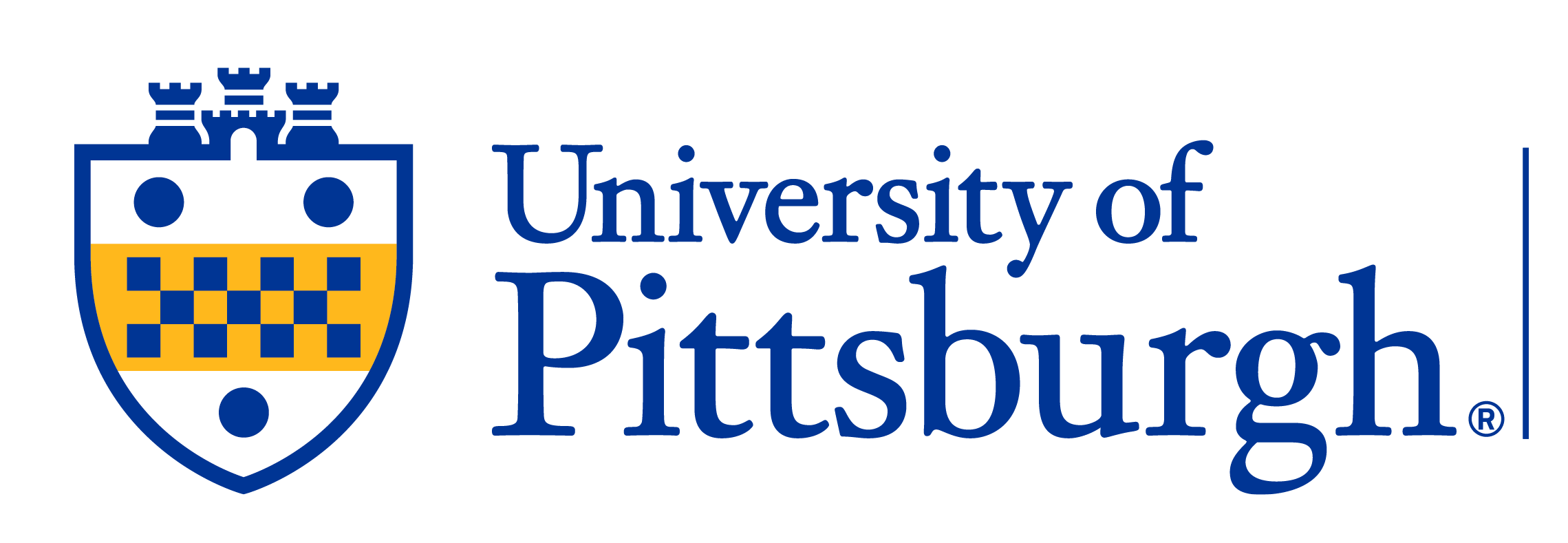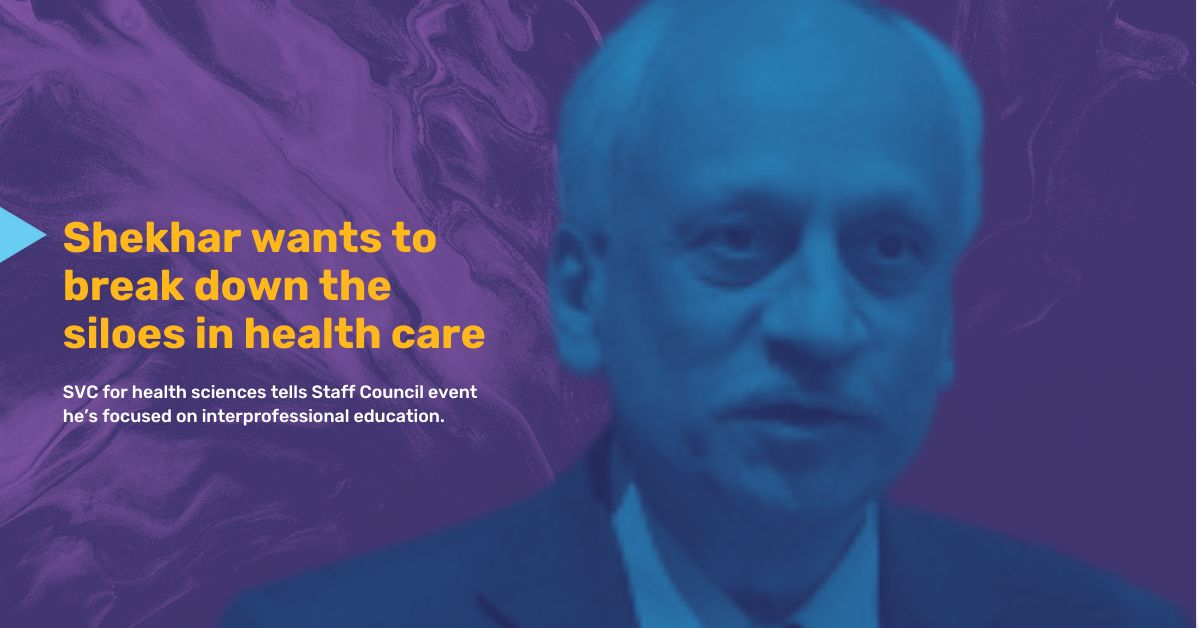By MARTY LEVINE
“When you begin to work at a broader scale beyond just a department or a school, you realize that health care is a team sport,” said Anantha Shekhar, senior vice chancellor for the health sciences, at the latest Staff Council Coffee and Conversation event on April 18. “It is not just being a physician. It’s not just nursing. It’s not just pharmacy. When you think about a patient, then the entire team has to be functioning well for the best outcomes for the patients.
“Obviously, if we have a great physician who does great diagnosis and prescribes great treatment, if that is not transcribed properly into appropriate prescriptions in the pharmacy or appropriate compliance at home, all of that great diagnosis and treatment planning is pretty much worthless.”
“So I’ve always felt like health is a team sport and how the health workforce should be taught in teams,” said Shekhar, who is also the dean of the School of Medicine. “I’m a very big believer in interprofessional education, interprofessional team building, and so that’s one thing that drew me to a job where I can oversee all of that and have the ability, if not to change health care broadly, at least influence it in a positive way.”
Shekhar said some of his formative experiences took place in his early years growing up and completing his medical education in India.
“When I was around 15 years old,” he recalled, “one of my heroes was my aunt’s son. He’s always the guy that I looked up to. He was brilliant. He was an incredible engineer and a mathematician, had all kinds of successes academically, and we felt like he was going to be a great scholar and contributor. But at age 24 he had a sudden psychotic breakdown and was diagnosed with schizophrenia, and over the next 10 years I saw the gradual destruction of his life, my aunt’s life, my uncle’s life, and the whole family just fell apart. … I felt that was very tragic and that kind of affected me. I wanted to do something about that.”
It was part of his impetus to become a psychiatrist, he said: “When I went into psychiatry in the early ‘80s, there was very little understanding of psychiatric disorders. We were still operating on a diagnostic manual called DSM II. … Homosexuality was a disease at that time, psychiatrically, and we were expected to treat it. It was that primitive. Then you start thinking about: we don’t even understand what is happening in the brain.”
This prompted Shekhar to pursue a neuroscience Ph.D. “I felt like all psychiatrists need to start becoming neuroscientists and neuroscience researchers to make a difference.”
The impulse to change the health-care system has continued to this day, leading him to join Pitt almost four years ago: “I did 30 years of research and clinical practice and you realize that you do a lot of that well, and you accomplish things, but you want to have impact at broader and broader levels. I can discover some things in my lab, I can publish on that, I can even develop a new treatment based on it, and those are all wonderful things. But you also want to make a difference in the next generation, difference in the way the system works and difference in how we need to impact society. …
“Because I had done everything I could in a medical school. I had done everything I could at a state-level research building. But what I hadn’t done was really, how do we change health care, how do we change the health-care workforce, and how do we create the next generation of leaders and the next generation of health outcomes that is sorely needed in our country and in the world?”
His emphasis on interprofessional education stems from the same motivation, he said. “Obviously, one of the things you realize is that these professions have been siloed for literally centuries. It’s not this has been something that happened 10 years ago, 20 years ago. And then the accreditation bodies for these schools have been kind of siloed for centuries. So there’s a whole series of structural siloing that you have to break.”
His first steps, he said, have been a joint mission for Pitt’s six health sciences schools, and a joint financial incentive to work together, “creating openings in each of their curricula for them to learn in teams. These may seem trivial on paper but they are massive structural changes for universities that have functioned the same way for centuries.
“For the first year, this year, we had 1,400 first-year students across all the six health sciences schools learn in small groups a single module of how to evaluate a patient,” Shekhar noted, involving “75-plus of our instructors from all of the different schools. … Next year they’re going to be doing mock patients … and then the third year they’ll be doing real patients.
“As we start thinking about going forward in medical and health-care research it also requires teams,” he added. “It’s not (that) one investigator is working hard in the lab and coming up with a great discovery anymore. We have to think of: How do we learn from our electronic health records? How do we learn from our patient samples? How do we then take that to the lab and analyze it at the fundamental molecular level? And then how do we bring it back to patients again to test in the clinic? That full circle of research activity again requires a team of multiple professionals.”
Asked about his future goals for the health sciences schools, Shekhar said that rankings and levels of grant funding are important, but he has even higher aims: “That’s not why I show up to work,” he said. “The next generation of physicians and scientists, how do we train them, what do we do to change the way we both educate them but also shape them as people, as leaders, as physicians, as scientists? That is one that I worry about in the short term, because I think we really need to transform U.S. health care and the U.S. health-care workforce to become more focused on outcomes, to become more focused on value and costs and the outcomes that really are not very good right now….
“The second thing I think about is, beyond the next generation, what do we do for patients in terms of whether it’s diseases that currently we don’t treat terribly (well) or we don’t have good treatments for, how do we discover those? Or for diseases that we have great treatments, how do we improve outcomes? And sometimes that has nothing to do with bench research, it has to do a lot with implementation. …
“Ten years from now, what would the world look like and how can the medical school make a difference in that vision? I think it’s a very complex sort of challenging philosophical question, but to me I think, 10 years from now, if med schools are simply training doctors to become super specialists getting paid a million dollars each, we’ve failed. What we do need is doctors who actually think about health care work as team leaders, create value for our society and make a difference in our people’s health.”
Marty Levine is a staff writer for the University Times. Reach him at martyl@pitt.edu or 412-758-4859.
Source: University Times


